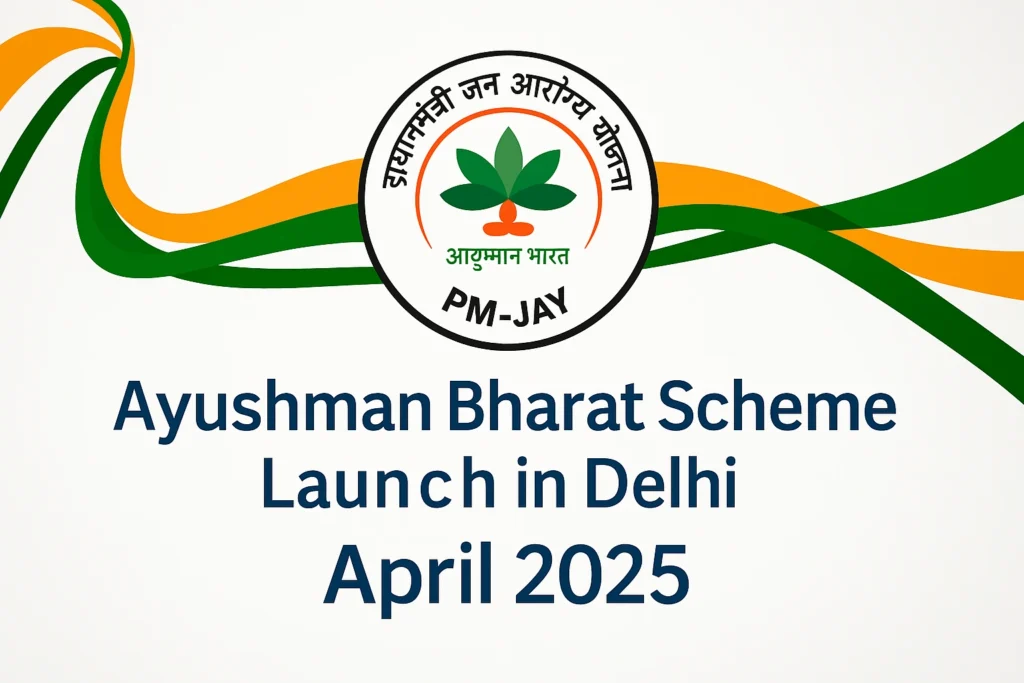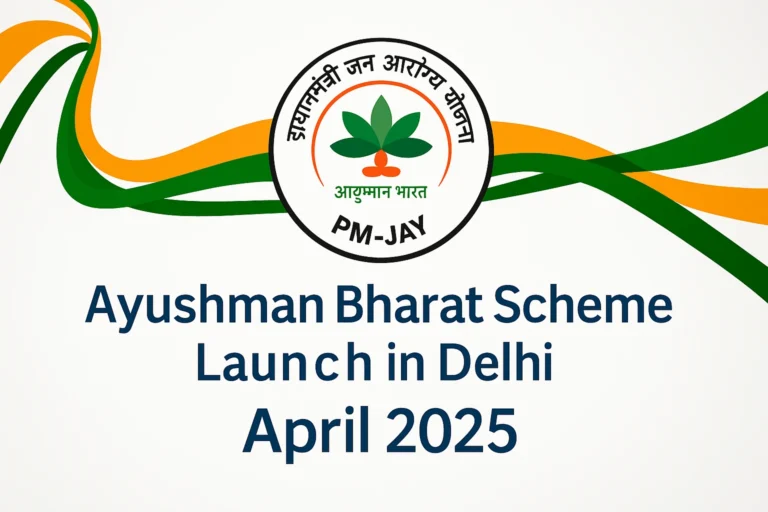Delhi has officially become the 35th state or Union Territory in India to implement the Ayushman Bharat Pradhan Mantri Jan Arogya Yojana (AB PM-JAY), marking a significant milestone in the country’s healthcare reform. The announcement was made on April 5, 2025, as the Delhi government signed a Memorandum of Understanding (MoU) with the National Health Authority (NHA). This long-awaited decision will now allow millions of Delhi residents to benefit from cashless, government-sponsored healthcare.
The scheme was launched in the presence of Chief Minister Rekha Gupta and Union Health Minister J P Nadda. CM Rekha Gupta called it a historic move and expressed gratitude to Prime Minister Narendra Modi and the central government. Health Minister Pankaj Kumar Singh stated that card distribution and beneficiary registration would begin from April 10, 2025.
The Ayushman Bharat scheme is already operational in 34 states and Union Territories. With Delhi’s inclusion, only West Bengal remains outside the scheme’s coverage. This launch is expected to bring high-quality medical access to more than 6.54 lakh families in the national capital.

What is Ayushman Bharat Pradhan Mantri Jan Arogya Yojana (PM-JAY)
Launched in 2018, Ayushman Bharat PM-JAY is one of the largest government-funded healthcare schemes in the world. It provides a health insurance cover of up to Rs 5 lakh per family per year for secondary and tertiary care hospitalization. In Delhi, the state government has announced an additional top-up of Rs 5 lakh, increasing the total coverage to Rs 10 lakh per eligible family.
Under this scheme, beneficiaries can avail free and cashless medical treatment for nearly 1,961 medical and surgical procedures across 27 different specialties. These include hospitalization, medications, diagnostics, ICU care, surgeries, and follow-up consultations.
Why Delhi’s Inclusion Matters
The implementation of Ayushman Bharat in Delhi is a significant move because it will drastically reduce the out-of-pocket expenditure for lower-income families. Previously, Delhi had not adopted the scheme, leaving lakhs of eligible citizens without access to its benefits.
By becoming part of the national healthcare initiative, Delhi joins hands with the central government to ensure that quality healthcare becomes a basic right, not a luxury. Delhi’s large population and high cost of living make this scheme even more critical for its residents.
Who Is Eligible for the Ayushman Bharat Card in Delhi
Eligibility for the Ayushman Bharat scheme is based on data from the Socio-Economic Caste Census (SECC) 2011. There are two broad categories of beneficiaries: rural and urban.
In urban areas, 11 occupational categories are considered eligible. These include domestic workers, construction laborers, street vendors, sanitation workers, ragpickers, beggars, security guards, delivery agents, transport workers, and other informal sector laborers.
In rural areas, beneficiaries include families meeting any of the following criteria:
- Families with no adult male member aged between 16 and 59
- Families living in one-room houses with kucha walls and roofs
- Scheduled Caste and Scheduled Tribe households
- Families without any able-bodied adult member
- Households relying on alms or manual scavenging
If your family is listed in the SECC 2011 data and meets the eligibility criteria, you can apply for the Ayushman Bharat card.
Hospitals Providing Ayushman Bharat Services in Delhi
The Delhi government has already empanelled 91 hospitals to offer services under the scheme. This includes:
- 46 private hospitals
- 34 Delhi government hospitals
- 11 central government hospitals
These hospitals will provide cashless treatment to Ayushman Bharat cardholders for the listed medical procedures. More hospitals are expected to be added to the list in the coming months.
How to Apply for Ayushman Bharat Card in Delhi
Eligible citizens in Delhi can apply for the Ayushman Bharat card both online and offline.
Online Application Process:
- Visit the official PM-JAY website at pmjay.gov.in
- Click on the ABHA (Ayushman Bharat Health Account) registration link
- Submit required documents such as Aadhaar card, PAN card, or voter ID
- Once verified, your Ayushman Bharat card will be generated digitally
Offline Application Process:
- Visit your nearest Common Service Center (CSC)
- Submit your documents and identity proof
- The CSC operator will verify your information and complete your registration
- You will be issued the Ayushman Bharat card once approved
Key Benefits of the Ayushman Bharat Scheme in Delhi
- Rs 10 lakh insurance coverage per family (Rs 5 lakh central + Rs 5 lakh state top-up)
- Cashless treatment at empanelled hospitals
- Coverage of 1961 procedures across 27 medical specialties
- 3 days pre-hospitalization and 15 days post-hospitalization expenses included
- No cap on family size, age, or gender
- Portability across India – beneficiaries can get treatment in any PM-JAY empanelled hospital nationwide
- Includes coverage for ASHA workers, Anganwadi workers, and other frontline health staff
To better understand how the Ayushman Bharat Scheme works and how it will impact residents of Delhi, you can watch this explanatory video:
Watch Now: Ayushman Bharat Scheme Explained – Video Guide
Impact of the Ayushman Bharat Scheme Nationwide and in Delhi
Nationwide, Ayushman Bharat has already benefited over 50 crore individuals since its launch in 2018. More than 5 crore hospital admissions have been processed under the scheme.
In Delhi, over 6.54 lakh families are expected to benefit from the scheme in the first phase of implementation. The government aims to expand hospital partnerships and raise awareness about the scheme in the coming months.
Key Announcements and Highlights
1. Chief Minister Rekha Gupta’s Statement
CM Rekha Gupta described the implementation as a “historic step” and thanked Prime Minister Narendra Modi for enabling Delhi’s residents to access healthcare benefits under the Ayushman Bharat scheme. She also announced an additional top-up coverage of ₹5 lakh from the Delhi government, taking the total coverage to ₹10 lakh per family in the capital.
2. Criticism of Previous AAP Government
Delhi Health Minister Pankaj Kumar Singh criticized the previous AAP-led government for delaying the implementation. He emphasized that the long-pending healthcare relief would now be accessible to the city’s most underserved communities. Beneficiary registration is set to begin on April 10, 2025.
3. MoU Signing with the National Health Authority
The MoU between Delhi’s Department of Health and Family Welfare and the NHA enables full-scale integration of the PM-JAY scheme in Delhi. This MoU outlines responsibilities, hospital empanelment, digital infrastructure sharing, and grievance redressal mechanisms.
Conclusion
The launch of the Ayushman Bharat scheme in Delhi is a transformative step for public health in the city. It brings affordable and quality healthcare to the doorsteps of the economically disadvantaged. With Rs 10 lakh in health insurance coverage and a growing network of empanelled hospitals, Delhi’s residents now have access to services that were previously out of reach for many.
As registrations begin on April 10, 2025, eligible families are encouraged to apply for the Ayushman Bharat card and secure a healthier, financially safer future.
This development positions Delhi as a crucial player in the nationwide mission to provide Universal Health Coverage under the National Health Policy.

